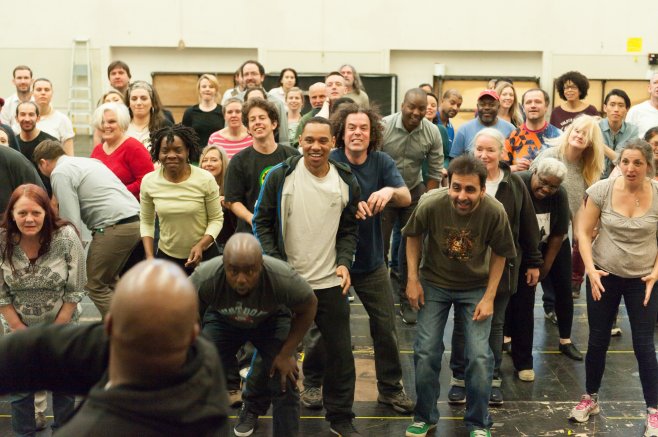Sharing the Stage – launching the learning community

It’s early February and a group of fourteen key players in participatory performing arts are gathered together in Hoxton Square. They are from organisations large and small, working across a range of disciplines, with a variety of focus groups and from all over the UK. Each represents one of the fourteen consortia of organisations selected through our Sharing the Stage open call and together they form the core of the Sharing the Stage Learning Community. Its raison d’etre: the fragmentation of participatory practice has been identified as a barrier to the exchange of information and sharing of resources that would enable real advances in the sector, so the development of a robust community of practice (forming networks, sharing knowledge and creating a stronger evidence base) is as important as the new models of participatory performing arts that the consortia in the group are developing individually.
The objective of this first gathering is for the cohort to get to know each other, get to know us and some of our other partners, and participate in shaping from the very outset the Learning Community that they form. A lot gets packed into the day. Jo Burns, an independent consultant who specialises in the arts, culture and creative economy and has been working with the Foundation to develop an evaluation framework for Sharing the Stage, runs workshops on the ‘Evaluation Framework’ and ‘Development of the Learning Community’. Jo invites us to respond to thoughts and phrases drawn from practitioners engaged in earlier stages of the selection process, including the Sharing the Stage networking event hosted in September. This generates animated debate and while some stick to the questions in hand, others embark on a creative but more philosophical discussion of the issues.
The ‘participants’ are often referred to, but the word proves controversial, as does the implied division between ‘practitioners’ and ‘participants’, which some argue are part of the same continuum. An inverted pyramid is drawn with the ‘participants’ in the narrowest section at the bottom, highlighting how change at ‘participant’ level is highly conditioned by a number of layers above, which include artists, curators, art organisations, funders and policy makers. How can we turn this into a more ‘horizontal’ conversation? Much of the debate focuses on ‘organisational change’, including organisations becoming confident about ‘outreach’ and making it central to their work. Some argue that organisational learning is as important as change, and that ‘learning’ cannot be the privilege of those in this group; it needs to be gathered from and extended to all others involved, including the ‘participants’ who should be involved from the outset. Suggestions going forward include a day’s symposium, presenting the work of the cohort and asking each to reflect on their learning, and the opportunity to share and network in a more informal way – ‘a six-hour coffee-break’.
The cohort is invited to let us know how the Foundation can support beyond funding and their wish list includes: ensuring that the community is non-hierarchical and all members of the cohort feel included; enabling dialogue with those at the top of the power pyramid in a neutral environment; having the opportunity to get advice at any stage and be open about potential challenges; getting support with the moral and ethical issues they face in times of austerity; a commitment to push forward and add credibility to the participatory performing arts; and branding which was acknowledged as positive in terms of profile and credibility, particularly for small organisations.
We end the day with a few solutions, numerous suggestions and many more questions than we had to begin with. The conversation has only just started and much stills needs to be decided, including a concrete plan for the frequency and type of gatherings and the characteristics of an online tool to facilitate the circulation of information between cohort members. But we have time ahead of us and this learning group is here to stay, so watch this space!
